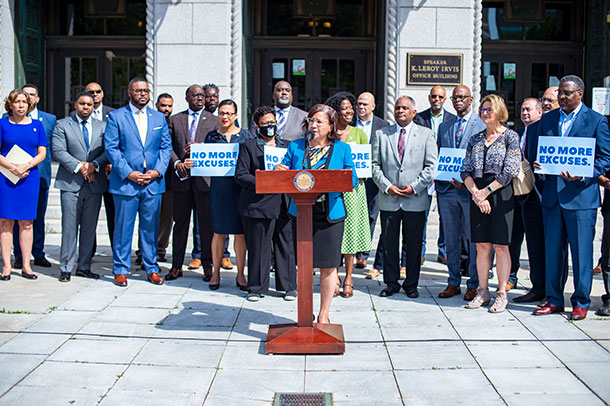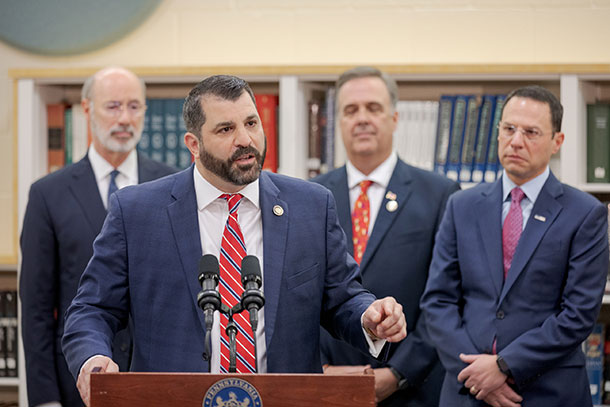Personality
The making of K. Leroy Irvis, the nation’s first Black speaker of the House
His legacy lives on as the architect of important programs – and as a consensus builder who united the chamber in trying times.

Irvis was a teacher, an activist and the first Black speaker of the House in any state legislature in the U.S. since Reconstruction. PA House Archives
K. Leroy Irvis knew a thing or two about making history.
When Irvis became the first Black speaker of the Pennsylvania House of Representatives – and the first Black speaker in any state legislature in the U.S. since Reconstruction – in 1977, he did so by uniting a chamber that was bogged down by controversy.
Moments before Irvis, a Pittsburgh Democrat, took the gavel for the first time, then-Speaker Herbert Fineman tendered his resignation after being convicted of two counts of obstruction of justice related to an influence-peddling investigation.
Irvis, recounting that fateful day in an interview with the Visionary Project, a website dedicated to preserving historical stories of Black leaders – and that took place before his death in 2006 – described the chaotic scene. “I walked in the rear doors,” Irvis recalled. As soon as I got in the rear doors I heard this rumbling and fussing. Two guys were in the back room, shaking their fists at each other and fingers. I thought, ‘What the hell is going on?’”
But after some confusion, some panic and some conversations, Irvis was able to earn the support of every member of the chamber, winning the speakership by unanimous consent. Nearly 50 years later, his legacy has been enshrined in Pennsylvania history as the architect of the PA Act 101 scholarship program – and a passionate poet, sculptor and model airplane appreciator.
His rise to the speaker’s rostrum, which has striking parallels to today’s state House, could provide lawmakers with a precedent on how to chart a path forward through gridlock and disagreement.
A day of unity
When Irvis entered the House chamber on May 23, 1977, he could tell something was different. There were disagreements. There was worry. There was no order.
“They were like children. No, they were more like hens in the henhouse where a fox has gotten inside. That would be a better description,” Irvis said in the Vision Project interview. “They were in a panic. These are grown men – mostly. These are leaders … but they were like scared children. I couldn’t believe it.”
Fineman nominated an interim speaker before submitting his resignation as both speaker and as a state representative. Irvis, who put his name into consideration before the chamber broke for caucus and committee meetings, spoke with Republicans and Democrats about how he would lead.
Members of both parties privately told Irvis that they thought he was the only person who could regain control of the chamber, and they backed up their words when it came time to vote, according to the House Journal from the day. One Republican, state Rep. Anthony Scirica of Montgomery County, said at the time that despite being from a different party, Irvis was “by ability, by experience and by temperament the best person for the job.”
Former Democratic state Rep. Helen Gillette, one of Irvis’ Allegheny County counterparts, agreed. “We have experienced some trying times and we need a leader who can draw us together,” she said on the House floor on the day of the speaker’s election. That man, she said, was Irvis.
Laurence Glasco, a University of Pittsburgh professor who is working on an autobiography of Irvis, told City & State that Irvis was able to earn the respect of lawmakers through his fairness and his reputation.
“He played it straight. He was honest. There was never any scandal in his 30 years there in Harrisburg. He didn’t cajole people. He didn’t do backroom deals. He just played it straight and was admired for it,” said Glasco, who was a neighbor of Irvis in Pittsburgh.
Looking to lower the temperature in the state House, Irvis, upon winning the speaker election, reportedly acknowledged that the chamber faced “troublesome times,” but said lawmakers had to work together to do the people’s work.
“I have come to this office not to cause more turmoil, not to raise further dissension but, hopefully, as the Speaker of the House of Representatives … to heal some of the wounds and to mend some of the breaks” plaguing the legislative body.
A day of action
Looking at Pennsylvania government today, it is easy to see Irvis’ lasting impact.
His legislation led to the creation of the Pennsylvania Higher Education Assistance Agency, the Pennsylvania Human Relations Commission and an ongoing scholarship program for disadvantaged students.
To commemorate the 45th anniversary of Irvis’ historic election as speaker, the Pennsylvania Legislative Black Caucus, led by Democratic state Rep. Donna Bullock, held the K. Leroy Irvis Day of Action last May to remember the late speaker and continue building on his legacy.
State Rep. Aerion Abney, who represents the 19th House District – the same district that Irvis represented at the end of his tenure, said at the time that the event offered an opportunity to build on Irvis’ legislative accomplishments.
“As we stand here today, 45 years later, and we continue to fight for racial, social, economic and generational justice, these are some of the same issues that Mr. Irvis fought for in his day,” Abney said. “When we come together, we realize that we’re not going to be able to solve all the issues as a Black Caucus in our tenure, but what we can do is, we can use our positions as leverage, as spheres of influence, to try to change the realities of the struggle for people and to build for the posterity of all future generations.”
Bullock said the idea for the day of action came as she was doing research on the history of Black lawmakers in the Pennsylvania General Assembly.
She said she wanted her colleagues to learn from the experiences of past Black lawmakers, and said that upon seeing that the 45th anniversary of the 1977 speaker vote was coming up, she “wanted to understand more about his legacy and wanted to take this opportunity to celebrate the 45th anniversary of when he was being sworn in.”
More than 45 years later, Bullock said Pennsylvania has made progress in electing more Black candidates to positions of power – pointing to the recent elections of Lt. Gov. Austin Davis and U.S. Rep. Summer Lee. But she also acknowledged there’s more room for growth.

“We’re seeing people of color get elected by predominantly white communities and districts,” she said. “So that is inspiring for me because we’re getting beyond the narrative of this being the first or the second. This is what it is, right? We are electing people because they are great leaders, because we believe in their values and we share those values. That’s very hopeful for me, and I think that we are moving in the right direction.”
Irvis, speaking from the floor of the House on May 23, 1977, would likely agree with Bullock – as he acknowledged the history and the progress that his election represented.
“You here today have done honor to this country and to its concepts,” he said in his first speech as speaker. “You have elected not a Black man to be speaker of the House of Representatives, but, more importantly, you have elected a man who happens to be Black, and that is the direction that this country must continue to go.”
A day in the future
In an act of transparency, Irvis also announced all three sources of his income and revealed that he and his wife owed $4,246 in back taxes as he spoke from the rostrum. “You have not elected a hidden millionaire,” he told colleagues with a mix of humor and candor.
One can speculate whether Irvis would have navigated today’s political climate as successfully as he did in 1977. According to Glasco, Irvis himself said around 20 years ago that Pennsylvania politics had become much more polarized than when he led the House.
“He said – this is 20 years ago already – that it would be more difficult now than when he was speaker. That Pennsylvania was getting polarized already. The urban-rural split was there, the Republican-Democrat split was there and it was … getting much harder to get people to work across the aisle with each other.”
Fast-forward to today, when legislative business in the state House was at a standstill for the entire month of January after lawmakers were unable to agree on House operating rules or how to move forward with a series of constitutional amendments. The House now has Berks County state Rep. Mark Rozzi leading the chamber following a last-minute deal that lifted Rozzi to the speakership in exchange for him agreeing to lead as an Independent. Just one month into his tenure, there’s already talk of whether Rozzi will remain in the role or not.

Glasco and Bullock agree that revisiting how Irvis led the chamber could provide some inspiration for today’s lawmakers.
Glasco said Irvis always strived to be a fair leader, and in that first speech, Irvis said he would always be an active listener when his colleagues wanted to have his ear. “I will talk and I will listen and I will learn, for you have all taught me much,” he said. “He gave each one as fair a shake as he could. They liked and respected it. I don’t know if that would work today. You want to think it would. It would be challenging.”
And as someone who currently leads the Pennsylvania Legislative Black Caucus, which Irvis formally created after the group met secretly for a few years, Bullock said incumbent lawmakers could gain much from studying the life and legacy of the state’s first Black speaker.
“If we don’t take advantage of this opportunity with the knowledge of the past that has been laid before us by folks like K. Leroy Irvis, then we fail as Pennsylvanians,” Bullock said.
“I’m really looking forward to using the legacy of K. Leroy Irvis and others to help us navigate waters that may be familiar – like some of what we’re seeing right now happening in the General Assembly – but also navigate waters that are brand-new.”
